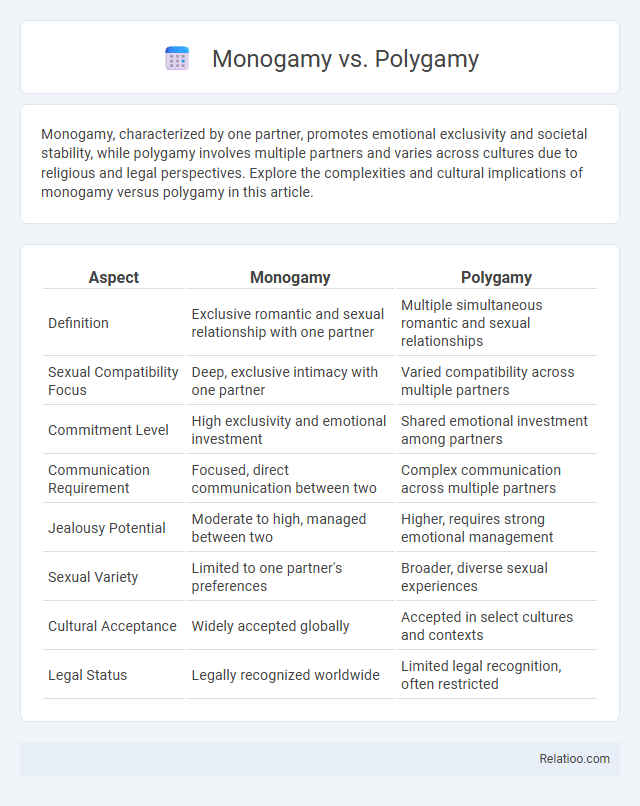Monogamy, characterized by one partner, promotes emotional exclusivity and societal stability, while polygamy involves multiple partners and varies across cultures due to religious and legal perspectives. Explore the complexities and cultural implications of monogamy versus polygamy in this article.
Table of Comparison
| Aspect | Monogamy | Polygamy |
|---|---|---|
| Definition | Exclusive romantic and sexual relationship with one partner | Multiple simultaneous romantic and sexual relationships |
| Sexual Compatibility Focus | Deep, exclusive intimacy with one partner | Varied compatibility across multiple partners |
| Commitment Level | High exclusivity and emotional investment | Shared emotional investment among partners |
| Communication Requirement | Focused, direct communication between two | Complex communication across multiple partners |
| Jealousy Potential | Moderate to high, managed between two | Higher, requires strong emotional management |
| Sexual Variety | Limited to one partner's preferences | Broader, diverse sexual experiences |
| Cultural Acceptance | Widely accepted globally | Accepted in select cultures and contexts |
| Legal Status | Legally recognized worldwide | Limited legal recognition, often restricted |
Understanding Monogamy and Polygamy
Understanding monogamy involves recognizing it as a relationship structure where an individual has one partner at a time, fostering deep emotional connection and exclusivity. Polygamy, by contrast, includes having multiple spouses simultaneously, often seen in cultural or religious contexts, with complexities in managing multiple relationships. Your choice between these relationship styles impacts social dynamics, emotional fulfillment, and legal considerations.
Historical Context of Relationship Structures
Historical context reveals that monogamy emerged as a dominant relationship structure in many societies due to legal, religious, and economic factors promoting pair-bonding and inheritance clarity. Polygamy, prevalent in various cultures worldwide, often signified social status and resource distribution, with practices like polygyny being more common than polyandry. Your understanding of these relationship structures benefits from recognizing how cultural evolution and social norms shaped the acceptance and regulation of monogamy versus polygamy over time.
Cultural Perspectives on Monogamy
Cultural perspectives on monogamy vary widely, with many societies viewing it as the preferred or normative relationship structure due to its emphasis on exclusivity and long-term commitment. Monogamy often aligns with legal and religious frameworks that promote family stability and inheritance clarity. Your understanding of monogamy can be enriched by exploring how different cultures shape attitudes toward marital exclusivity compared to polygamous practices.
Cultural Perspectives on Polygamy
Cultural perspectives on polygamy vary significantly across societies, with some embracing it as a traditional practice linked to social, economic, and familial structures, while others view it as incompatible with modern legal and ethical standards. In many African and Middle Eastern cultures, polygamy supports extended family networks and resource sharing, whereas Western cultures largely favor monogamy due to legal frameworks emphasizing individual rights and gender equality. Your understanding of polygamy's cultural context can provide deeper insight into how family dynamics and societal values shape marital practices worldwide.
Psychological Impacts of Monogamy
Monogamy often fosters emotional stability and deep attachment by promoting exclusive partnerships, which can enhance psychological well-being and reduce feelings of jealousy or insecurity. Studies indicate that monogamous relationships are associated with higher levels of trust, commitment, and long-term satisfaction compared to polygamous arrangements. Mental health benefits in monogamous unions stem from consistent emotional support and clear relational boundaries, contributing to lower stress and improved overall psychological functioning.
Psychological Effects of Polygamy
Polygamy often impacts mental health by increasing stress and feelings of jealousy due to complex family dynamics and divided attention among partners, which can affect emotional well-being. Research shows that individuals in polygamous relationships may experience lower self-esteem and higher rates of anxiety compared to those in monogamous partnerships. Understanding these psychological effects can help you navigate relationship choices with greater awareness of potential emotional challenges.
Legal Status of Monogamy and Polygamy Globally
Monogamy holds legal recognition as the standard marital form in most countries around the world, enforcing exclusive pair bonds through family law statutes. Polygamy remains legally permitted in several regions, particularly in parts of Africa, the Middle East, and South Asia, where cultural and religious laws support multiple spouses per individual. However, numerous countries actively prohibit polygamous marriages, deeming them illegal and often void under civil law, which underscores the global predominance of monogamy as the legally endorsed marital structure.
Societal Benefits and Challenges
Monogamy promotes social stability by fostering strong pair bonds and clearer parental responsibilities, which can lead to higher child well-being and economic cooperation. Polygamy, often observed in certain cultural contexts, may enhance social networks and resource sharing but can create challenges such as gender inequality, jealousy, and inheritance disputes. Understanding these dynamics helps societies balance individual freedoms with collective harmony and legal frameworks.
Religious Views on Monogamy vs Polygamy
Religious views on monogamy versus polygamy vary significantly across traditions, with Christianity predominantly endorsing monogamy as the divine ideal based on biblical teachings, while Islam permits polygamy, allowing up to four wives under specific conditions outlined in the Quran. Hinduism traditionally promotes monogamy but has historical instances of polygamy in certain contexts, influenced by cultural and regional practices. Jewish law permits polygamy with restrictions, though modern Judaism largely practices monogamy, reflecting evolving interpretations and secular legal frameworks.
Future Trends in Relationship Models
Future trends in relationship models suggest an increasing acceptance of diverse structures beyond traditional monogamy, including polygamy and monogamous adaptations tailored to individual needs. Technology and shifting social norms influence how people form connections, often encouraging flexible arrangements that prioritize emotional fulfillment and mutual consent. Your relationship choices will likely reflect these evolving patterns, emphasizing personalized compatibility and open communication.

Infographic: Monogamy vs Polygamy
 relatioo.com
relatioo.com